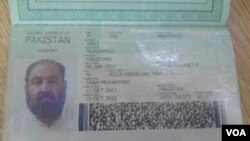Pakistan’s interior minister said Tuesday that a blood relative of Taliban leader Mullah Akhtar Mansoor had come forward to claim the charred body of the man who was killed in a U.S. drone strike in Pakistan’s Baluchistan province.
Chaudhry Nisar Ali Khan told a news conference in Islamabad that although the United States and Afghanistan had claimed that Mansoor was killed in a drone strike on Pakistani territory, it was not possible for Pakistan to confirm the news without scientific verification, like a DNA test.
That test, he added, was now underway because of an unexpected development.
“Only today, an opportunity has arisen when a member of his family, who has a blood relationship with him, has formally requested for the body to be handed over to him,” Khan said.
The government, he added, had immediately collected DNA samples from the relative and was waiting for the results to confirm that the body was that of Mansoor.
Criticism softening
Khan said the violation of Pakistan’s territory by a U.S. drone could have “serious implications.” But he seemed to soften the impact of his comment by adding that internal investigations had revealed that the U.S. drone didn't enter Pakistani territory. It was fired at Mansoor’s car from “another country,” he said, without naming the country.
Baluchistan province borders both Afghanistan and Iran.
Khan acknowledged that senior Pakistani officials in multiple government departments had played a role in issuing fake documents to Mansoor, although he blamed corruption for it. He said several officers had been either detained or were being probed for facilitating the documentation process for the slain Taliban leader.
“I have been banging my head against the walls,” Khan said regarding his efforts to reduce corruption in the authorities that issue national identity cards and passports.
The first ID card for Wali Mohammad, the alias that Mansoor allegedly used on his passport, was issued in 2001 when former military leader General Pervez Musharraf was in power, according to Khan.
The first passport was issued in 2005, again during Musharraf’s regime, and was renewed in 2011 during the former government of the Pakistan People’s Party.
Questions surrounding evidence
Khan also said Pakistan was investigating how Mansoor’s passport survived the drone strike on the car. Pakistan was informed seven hours after the drone strike, according to Khan.
He also said that Pakistan was investigating whether the passport found near the car was in the car at the time of the attack or someone threw it on the ground to mislead authorities. This was the reason he said Pakistan could not confirm whether Mansoor was using this passport when he crossed the border of Iran a few hours before he was killed.
Khan confirmed that the visas on Mohammad’s passport included Bahrain, Iran and Dubai. The passport also had stamps that showed it had been used to travel through Pakistani airports. The minister again rejected allegations his country was supporting the Afghan Taliban.
“Mansoor was traveling alone in a car with his driver. If he had the support and surveillance of Pakistani intelligence agencies, he would not have been traveling under these conditions and would have not entered Pakistan through a regular border post without any security and in broad daylight, Khan said.
The Pakistani minister suggested the killing of Mansoor could be detrimental for efforts aimed at seeking a negotiated settlement to the Afghan conflict, “because you cannot expect them [the Taliban] to come to the table after having droned their leader.”







